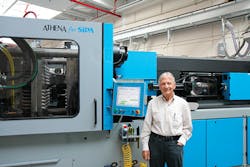Schad leaves indelible impression at Husky, Athena, Niigon
By Ron Shinn
One of the first giants of the plastics industry I ever heard about was Robert Schad. He died July 11 at age 95.
In 1989, when Plastics News launched and I was the managing editor, Schad was a bigger-than-life figure, who had emigrated from Germany to Canada as a 22-year-old tool and die maker with $25 in his pocket, and went on to found Husky Injection Molding Systems (now Husky Technologies), one of the most important plastics processing machinery manufacturers in the world.
One of our editorial colleagues had once worked for Husky in Bolton, Ontario, and regaled us with stories about Schad. One story was that he had a desk on a raised platform in the middle of a large, open office so he could see what everyone was working on. Getting called to the boss’ desk — with everyone watching — was generally not a pleasant experience.
Schad once asked my colleague what he would need to start a custom injection molding business. My friend launched into an extensive list of the type of equipment and machinery he would buy and the projects he would go after first in order to keep startup costs low. Schad listened, then with a laugh said none of that was correct. You need a customer first, he said.
Schad sold Husky in 2007 for $957.6 million. At the time, Husky had sales of $1 billion and more than 3,500 employees.
I first met Schad shortly after that. I was visiting Husky in Bolton and Schad walked across the parking lot. We chatted briefly, then he got into a Toyota Prius that was a couple years old — not the ride I was expecting for a multimillionaire, but I later learned it was about right for a passionate environmentalist and philanthropist.
I visited Schad several times after 2008 when he launched Athena Automation Ltd. in Vaughan, Ontario, to build flexible, modular, two-platen molding machines. While I did not know Schad in the early days of Husky, I cannot imagine a person who was more in his element than Schad was in the early days of Athena Automation, which in 2018 was renamed Niigon Machines Ltd.
He built a huge, $45 million plant to manufacture the machines and was proud to show off how his building design enhanced workflow along with employee amenities such as a cafeteria and fitness center.
Schad started with a clean sheet of paper and designed his machines exactly how he thought they should be designed.
He had long believed that plastics processors were missing opportunities if they did not embrace lights-out manufacturing. “Lights-out automation is the ultimate step in reducing manufacturing costs,” Schad told PMM in a profile published in 2014.
Schad has been described as an engineer’s engineer, and I think that was correct. He once told me that being able to brainstorm with young engineers at Athena was the best part of the job.
An Athena executive told me that Schad spent a big portion of every day with those engineers. “Schad’s influence in pushing his engineers to take risks to figure out better ways to solve problems without fear of failure is evident,” the executive said. “He drives solutions.”
During one visit, when Athena was already struggling with slow sales, there were nine finished molding machines lined up on the plant floor. Some had already been sold, but when I asked why they had not been shipped, Schad explained that he noticed a machine operator struggling to work on an internal part. His solution — cut an access door in the rear of the molding machine housing. These nine machines were waiting on their doors.
“We won’t ship any machine that is not the best we can make it,” he explained.
He was a demanding and tough boss but earned respect from people who worked for him.
Schad also loved to tell jokes, and it did not matter to him if they were politically correct. I can recall at least two occasions sitting with a group at his table in the company cafeteria and hoping people at the next table did not hear the joke he just told.
There has been plenty of speculation as to why Athena failed while Husky so wildly succeeded. The timing of COVID-19 perhaps played a part.
But I think that the engineering side of Schad’s brain overtook the business side. For example, Husky was a frequent advertiser and had large booths at NPE. Athena did the opposite. People will buy these machines because they are better than the others … that should be enough, he said.
About the Author
Ron Shinn
Editor
Editor Ron Shinn is a co-founder of Plastics Machinery & Manufacturing and has been covering the plastics industry for more than 35 years. He leads the editorial team, directs coverage and sets the editorial calendar. He also writes features, including the Talking Points column and On the Factory Floor, and covers recycling and sustainability for PMM and Plastics Recycling.
